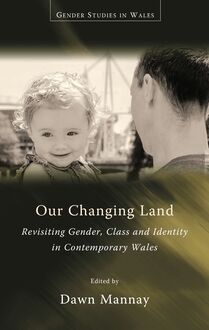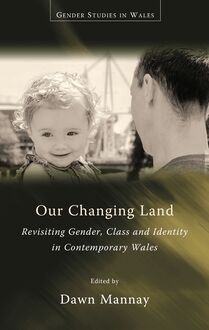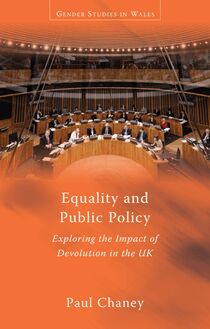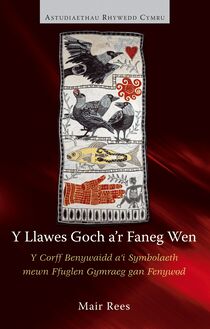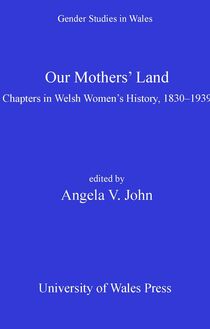Women, Identity and Religion in Wales , livre ebook
108
pages
English
Ebooks
2018
Vous pourrez modifier la taille du texte de cet ouvrage
Obtenez un accès à la bibliothèque pour le consulter en ligne En savoir plus
Découvre YouScribe en t'inscrivant gratuitement
Découvre YouScribe en t'inscrivant gratuitement
108
pages
English
Ebooks
2018
Vous pourrez modifier la taille du texte de cet ouvrage
Obtenez un accès à la bibliothèque pour le consulter en ligne En savoir plus
Publié par
Date de parution
15 février 2018
Nombre de lectures
0
EAN13
9781786831958
Langue
English
Women, Identity and Religion in Wales is the first comprehensive study of its kind from a present-day perspective. It brings significant and original insights to an understanding of Welsh identity and religion, as well as exploring the distinctive pressures that women in Wales face in their everyday lives. The author provides a qualitatively rich account of the religious and sociological context and interweaves her own experience with that of a number of Welsh women writers, including Menna Elfyn, Jasmine Donahaye and Mererid Hopwood, to offer an in-depth understanding of the dynamic interplay between Welsh female identity and religion. At the heart of the book are conversations with thirteen other women whose lives and experiences reveal how women facing misogyny, repression and stigmatisation are able to respond with resilience and humour. The author concludes that Welsh women have an empowering stereotype, the Strong Woman, and are constructing new identities for themselves beyond the pressures to be respectable and submissive.
Acknowledgements
Introduction
1 What Do We Mean by Identity?
2 Constructed Welsh Identities?
3 Wales, Religion and Identity
4 Religion, Women and Wales
5 Life Stories
6 Welsh Identity and Religion in Women’s Writing
7 In Conversation with the Strong Woman
8 Constructing New Identities
Appendix: Research Methods
Notes
Reference List
Index
Publié par
Date de parution
15 février 2018
Nombre de lectures
0
EAN13
9781786831958
Langue
English
WOMEN, IDENTITY AND RELIGION IN WALES
Gender Studies in Wales Astudiaethau Rhywedd yng Nghymru
Series Editors
Dawn Mannay, Cardiff University
Rhiannon Marks, Cardiff University
Diana Wallace, University of South Wales
Stephanie Ward, Cardiff University
Sian Rhiannon Williams, Cardiff Metropolitan University
Series Advisory Board
Deirdre Beddoe, Emeritus Professor
Mihangel Morgan, Aberystwyth University Teresa Rees, Cardiff University
The aim of this series is to fill a current gap in knowledge. As a number of historians, sociologists and literary critics have for some time been pointing out, there is a dearth of published research on the characteristics and effects of gender difference in Wales, both as it affected lives in the past and as it continues to shape present-day experience. Socially constructed concepts of masculine and feminine difference influence every aspect of individuals’ lives; experiences in employment, in education, in culture and politics, as well as in personal relationships, are all shaped by them. Ethnic identities are also gendered; a country’s history affects its concepts of gender difference so that what is seen as appropriately ‘masculine’ or ‘feminine’ varies within different cultures. What is needed in the Welsh context is more detailed research on the ways in which gender difference has operated and continues to operate within Welsh societies. Accordingly, this interdisciplinary and bilingual series of volumes on Gender Studies in Wales, authored by academics who are leaders in their particular fields of study, is designed to explore the diverse aspects of male and female identities in Wales, past and present. The series is bilingual, in the sense that some of its intended volumes will be in Welsh and some in English.
WOMEN, IDENTITY AND RELIGION IN WALES
Theology, Poetry, Story
Manon Ceridwen James
© Manon Ceridwen James, 2018
All rights reserved. No part of this book may be reproduced in any material form (including photocopying or storing it in any medium by electronic means and whether or not transiently or incidentally to some other use of this publication) without the written permission of the copyright owner except in accordance with the provisions of the Copyright, Designs and Patents Act. Applications for the copyright owner’s written permission to reproduce any part of this publication should be addressed to the University of Wales Press, 10 Columbus Walk, Brigantine Place, Cardiff, CF10 4UP.
www.uwp.co.uk
British Library Cataloguing-in-Publication Data
A catalogue record for this book is available from the British Library.
ISBN 978-1-7868-3193-4
e-ISBN 978-1-7868-3195-8
The right of Manon Ceridwen James to be identified as author of this work has been asserted in accordance with 77, 78 and 79 of the Copyright, Designs and Patents Act 1988.
The University of Wales Press acknowledges the financial support of the Isla Johnston Trust.
The publisher has no responsibility for the persistence or accuracy of URLs for any external or third-party internet websites referred to in this book, and does not guarantee that any content on such websites is, or will remain, accurate or appropriate.
Cover image: Christine Kinsey, Ymddiddan 1 / Colloquy 1 , 2005 © the artist.
I Dylan, Miriam, Catrin a Harri, Mam a Dad, gyda chariad a diolch
Contents
Acknowledgements
Introduction
1 What Do We Mean by Identity?
2 Constructed Welsh Identities?
3 Wales, Religion and Identity
4 Religion, Women and Wales
5 Life Stories
6 Welsh Identity and Religion in Women’s Writing
7 In Conversation with the Strong Woman
8 Constructing New Identities
Appendix: Research Methods
Notes
Reference List
Acknowledgements
My grateful thanks go to the women in this study who shared so willingly and generously their life stories with me. Their resilience and strength has inspired me, as will become clear throughout the book.
I have had the privilege of being taught by many excellent teachers and lecturers as well as having been inspired by several people who have either made an impact on me from a distance or encouraged me personally along the way. I would particularly like to mention Christine Evans, Hefin Elias, Alan Hill, Deirdre Beddoe, John Sweet, Ian Stubbs, Jeremy Begbie and John Parr. This part of my journey was inspired by Stephen Pattison’s book Shame which introduced me to a new way of doing theology that is both relevant and transformative. I was very fortunate to have him as the supervisor for my thesis and I am very grateful to him for all his support and insight which have made a huge contribution to this book. His writings within Practical Theology have been very influential to both my thinking and practice. I am also grateful to Chris Shannahan and Martin Stringer who contributed to my supervision and very much to my thinking and learning. Mark Pryce has also been a great encouragement to me in seeing the connections between theology and poetry.
Sarah Kennedy, Kim Moore and Nigel Jenkins were key influences as I started to find my poetic voice again and I thank them, along with John Fraser Williams, Gillian Clarke and Fiona Sampson for help with the drafting of some of the poems in this book.
I have gained much encouragement and stimulation from belonging to a symposium of feminist qualitative theological researchers. Thanks to Nicola Slee, Anne Phillips and Fran Porter in particular for including my work in their edited collections of papers arising from this symposium and for the help of many good friends made there. As well as Nicola, Anne and Fran, the following women have all contributed to my thinking as a theologian and researcher: Jennie Hurd, Allison Fenton, Alison Woolley, Kim Wasey, Ruth Perrin and Emma Rothwell.
I want to thank those who commented on parts of my original PhD thesis: Paula Yates, Graeme Smith, Fflur Dafydd, Dylan James, Dilys Williams and Ruth Russell-Jones. I was very grateful to them for their observations which helped me improve my writing. Ruth especially did a great job of finding my inconsistencies. Thanks especially to Dawn Llewellyn for her comments and help with the final draft of the book.
I also acknowledge with gratitude the financial support of the Isla Johnston Trust and Gladstone’s Library. Much of the initial groundwork was completed during stints at Gladstone’s and I was delighted to have received a scholarship from them which enabled me to spend a week there, and I also benefited from other brief stays at a reduced rate.
I would like to thank Menna Elfyn for her generosity in allowing me to use her brilliantly empowering poem Will the Ladies Please Stay Behind in full and for her permission to use her material in this book as well as her encouragement. I am also extremely grateful to Christine Kinsey for allowing me to use her thought-provoking and striking picture Ymddiddan 1 / Colloquy 1 for the cover of this book.
Finally, I want to thank my husband and family for their support always – Dylan, Miriam, Catrin, Harri and my parents, Dilys and Brian. The book is dedicated to them as well as to the women whose courageous and inspiring voices are heard throughout the book.
Some more formal acknowledgments are also due, for parts of my work that have appeared in other publications. I gratefully acknowledge permission for use of the following material:
Manon Ceridwen James, ‘Fat Chicks, Blue Books and Green Valleys: Identity, Religion and Women in Wales’, in Nicola Slee, Fran Porter and Anne Phillips (eds), The Faith Lives of Women and Girls , Chapter 8, pp. 103–9 (London: Routledge, 2013).
Manon Ceridwen James, ‘Song of a Voiceless Person: Using the Poetry of Menna Elfyn in a Study of Welsh Women’s Identity and Religion’, in Nicola Slee, Fran Porter and Anne Phillips (eds), Researching Female Faith , Chapter 11 (London: Routledge, 2018).
Acknowledgements are due to the editors of Envoi and Obsessed with Pipework where some of my poems first appeared. I am particularly grateful to Jan Fortune of Cinnamon Press (who publish Envoi ) for publishing my first ever poem in a poetry magazine.
Introduction
All research is to an extent, autobiography. (Swinton and Mowat, 2006: 60)
What is the extent and nature of the impact of religion on the identities of Welsh women? This book is the story of how I attempted to answer this question. I explore the experiences and voices of a range of women and their insights into their personal and national identities within the context of a Wales which has, until recently, thought of itself as a religious nation. These voices come in a variety of forms: women I interviewed about their life stories and perspectives, the writings of several significant female poets and authors as well as the work of theologians, sociologists, historians and other theorists who have written about women, identity, religion and Wales.
Issues of identity, Welshness and religion have always been important to me. I am a first-language Welsh speaker, brought up in Nefyn on the Llŷn Peninsula, having studied, lived and worked in many different parts of Wales. I have also worked as a parish priest and training officer for the Church in Wales for over twenty years. However, the reason I started on this journey was not simply personal; it was also to understand how religion and Welsh identity had shaped the experiences of other women I had met during the course of my work and personal life.
One Sunday, when I was a diocesan officer, I covered two services for a priest who was on holiday and conversations in each of these two rural churches made an impact on me. Before the first service, I chatted with the worship leader who had a postgraduate degree in theology. When I asked her whether she had considered ordination she said that she was not ‘good enough’, despite being articulate and popular in the parish, with a Masters in theology. At the second service I spoke to another worship leader who

